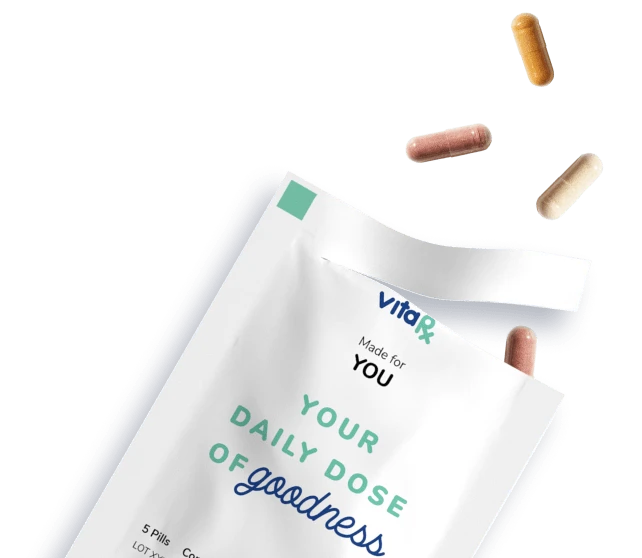Last update: May 31, 2025
7 minute read
The Health Benefits of Vitamin C
Discover the health benefits of vitamin C, including what it's good for, the best food sources, daily dosage tips, and the benefits of taking vitamin C supplements.

By Stephanie Wright, RN, BSN
Edited by Dr. Jacquie Leone, NMD, HN

Vitamin C is an essential nutrient with a wide range of benefits of vitamin c for everyday health. In this post, we explore what vitamin C is good for, its nutritional role, and the many vitamin C health benefits—from its antioxidant properties to its role in collagen production.
Whether you’re curious about the benefits of taking vitamin C through your diet or vitamin C tablets benefits as a supplement, read on to learn more about the benefits of vitamin C and how you can easily incorporate it into your daily routine.
Key takeaways
- We can't store or produce vitamin C, so it's crucial to get it from food or supplements
- Vitamin C protects against diseases by fighting harmful substances in your body
- Vitamin C helps your body by supporting the immune system, making neurotransmitters, producing collagen, and regulating stress hormones
What is vitamin C?
Vitamin C is a cofactor in various enzymatic reactions. High levels of this vitamin play an important role in the production of skin, bones, teeth, collagen, connective tissue, and red blood cells. Vitamin C is a necessary vitamin and essential nutrient needed to produce:
- Neurotransmitters: Important brain chemicals that support mental function, learning, mood, appetite, and sleep
- Collagen: An abundant structural protein found in skin, bones, cartilage, tendons, ligaments, and blood vessels
- Stress hormones
- Immune system cells
Additionally, the antioxidant properties of vitamin C allow it to hunt unstable, harmful, free radicals in the body, protecting your cells and molecules from oxidative damage. The high antioxidant activity of vitamin C may help reduce the risk of developing chronic diseases.

Why vitamin C is a must-have in your diet
Understanding the benefits of vitamin C means recognizing how it contributes to everyday wellness. Here are some key points that explain what vitamin C is good for:
- Supports collagen production: Vitamin C is vital for creating collagen, a protein that helps maintain healthy skin, joints, and connective tissues.
- Acts as an antioxidant: Its antioxidant properties help protect cells from oxidative damage, which is one of the main benefits of taking vitamin C.
- Enhances nutrient absorption: It aids in the absorption of iron and other important nutrients, showcasing one of the practical vitamin C supplement benefits.
These everyday benefits of vitamin C are widely recognized in nutritional science and are central to maintaining a balanced diet.
Health benefits of vitamin C:
Let's dive more in-depth into the science-backed health benefits of vitamin C and why you should consider increasing your daily dose.
1. Immunity
Vitamin C may help you fight off infections and reduce illness duration. It's involved in producing infection-fighting white blood cells and protects immune cells from being harmed by unstable free radicals.
This is one of the main reasons healthcare providers may recommend a glass of orange juice at the start of cold symptoms. This form of vitamin C is helpful for overall immune function.
A daily intake of vitamin C won’t protect most from colds. But it can shorten the amount of time you’re ill. If you already have a cold, vitamin C won’t affect the cold.
VitaRx Tip
Without enough vitamin C, collagen strands become weak, resulting in loss of skin elasticity, firmness, and hydration.
2. Healthy skin
You can find plenty of Vitamin C in skin cells where it promotes strong, elastic, and glowing skin. It can protect the skin from free radical damage and signs of premature aging.
This vitamin is a cofactor for collagen production and maintenance. Collagen is the skin's structural protein found in human skin, bones, blood vessels, muscles, and tendons.
This protein is especially important for your skin health. Clinical trials have also shown it speeds up wound healing and reduces damage from sun exposure.
3. Eye health
Vitamin C is one of many nutrients that play an important role in your eye health. Clinical research shows that vitamin C can help you avoid cataracts and vision loss in older adults.
Because this vitamin helps you prevent tissue damage and eliminate harmful free radicals, a high dietary intake of vitamin C works with vitamin E to protect your eyesight for a long time to come. You can protect against the progression of age-related macular degeneration when you start increasing your vitamin C intake at an early age.
4. Cardiovascular health
Research suggests the antioxidant properties of vitamin C protect the cardiovascular system and may reduce the risk of the world's number one killer, cardiovascular disease. Maintaining healthy vitamin C levels prevents the oxidation of cholesterol and lowers cholesterol levels, blood pressure, arterial stiffness, and inflammation—all major risk factors for heart disease.
If you are at high risk for cardiovascular disease, talk to your healthcare provider about the role of vitamin C in your preventative measures. Every step you take to avoid high blood pressure and strengthen your heart could help you prevent an untimely heart attack or heart disease diagnosis.

Best vitamin C foods
Most healthy adults can get their daily mg of vitamin C from a balanced diet. Check out some of these good sources of vitamin C:
- Citrus fruits (oranges, orange juice, lemon, lime, etc.)
- Berries, especially strawberries
- Broccoli
- Leafy greens
- Bell peppers
- Tomatoes
- Sweet potatoes
- Brussel Sprouts
Many people struggle to get the five vegetables a day that nutrition experts recommend. Plus, cooking methods often deplete vitamin C levels in your food.
VitaRx Tip
A dietary supplement is a fantastic way to increase vitamin C intake and optimize your overall health.
Risk factors for a vitamin C deficiency
While acute vitamin C deficiency, or Scurvy, isn't common in developed countries, many people still struggle with low vitamin C levels. Poor immunity, fatigue, anemia, bruising, and slow wound healing are all red flags for chronically low vitamin C and a sign that you need to up your intake!
Before you catch these early symptoms, knowing if you may be at high risk for vitamin C deficiency is important. Some of the factors that decrease vitamin C levels include:
- Stress
- Excessive sun exposure
- Intense exercise
- Pregnancy
- Cigarette Smoke
- Infections
- Poor diet
- Chronic illness/medical conditions
If you start to notice symptoms, speak to your healthcare provider or nutrition expert to see if a supplement may be right for you.
Frequently asked questions (FAQ)
Final thoughts
Vitamin C is a powerhouse nutrient that supports everything from your immune system and skin to nutrient absorption and daily energy levels. Whether you’re getting it from fruits and vegetables or considering a supplement, the benefits of vitamin C are well worth it.
Now that you know what vitamin C is good for and how to get enough of it, you can confidently make it a part of your daily routine. Just remember—consistency is key when it comes to seeing the full vitamin C health benefits.
Source
- Vitamin C - Health Professional Fact Sheet
- The Long History of Vitamin C: From Prevention of the Common Cold to Potential Aid in the Treatment of COVID-19
- Common colds: Does vitamin C keep you healthy? - InformedHealth.org - NCBI Bookshelf
- Impaired Wound Healing - StatPearls - NCBI Bookshelf
- Vitamin C and the Lens: New Insights into Delaying the Onset of Cataract - PMC
- Nutrients for Prevention of Macular Degeneration and Eye-Related Diseases - PMC
- Vitamin C and Cardiovascular Disease: An Update - PMC
Author

Stephanie Wright
Stephanie brings over 13 years of diverse nursing experience to the table, having honed her expertise in critical care, mental health, and utilization management. Her journey as a registered nurse across these various healthcare sectors underscores her adaptability and deep commitment to patient care.
Fact checker

Dr. Jacquie Leone
Dr. Leone holds a BA in Psychology, a Doctorate in Naturopathic Medicine, and board certification in holistic nutrition. In addition to practicing medicine, Dr. Leone has developed and currently teaches science and nutrition courses for a nationally accredited institution. She specializes in chronic illness, gastrointestinal dysregulation, inflammatory conditions, and mental health. Her unique approach combines the wisdom of Eastern medicine with the technology and science of Western medicine, offering an integrative approach heavily focused on functional medicine.
At VitaRx, we're not just passionate about our work — we take immense pride in it. Our dedicated team of writers diligently follows strict editorial standards, ensuring that every piece of content we publish is accurate, current, and highly valuable. We don't just strive for quality; we aim for excellence.
Related posts
While you're at it, here are some other relevant articles you might be interested in.

Get your personalized vitamin recommendations in less than
5 minutes.
Get your personalized vitamin recommendations in less than
5 minutes.







